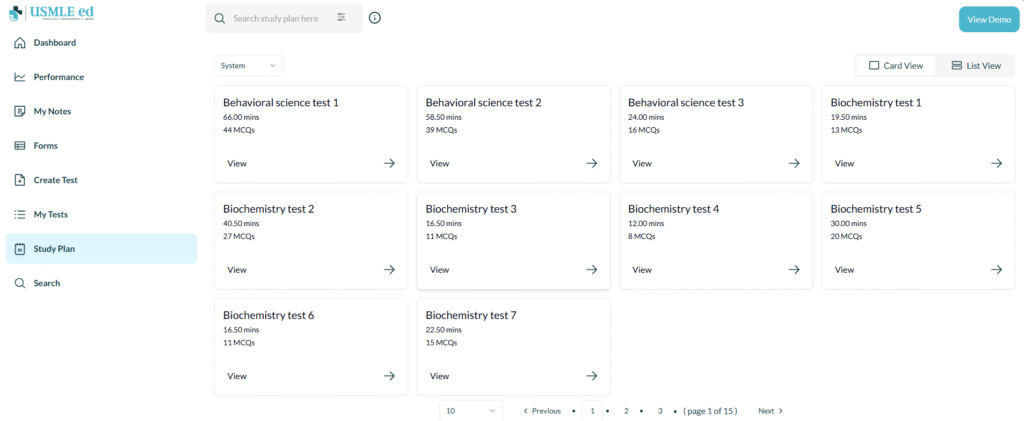Preparing for the USMLE can feel like navigating a maze—thousands of pages, hundreds of hours, and a high-stakes exam waiting at the end. The truth? A personalized study plan isn’t just helpful—it’s essential.
But how do you create a customized USMLE Study plan that fits your timeline, learning style, and weak areas?
Start with the one tool designed for exactly that: a high-quality USMLE QBank.
Here’s how to build a personalized USMLE study plan using your USMLE QBank, step by step.
Step 1: Define Your Timeline & Target Score
Ask yourself:
- When is your exam date?
- How many weeks/months do you have left?
- What’s your target score (or specialty goal)?
Example timelines:
- 3 months left: Aim for 40–60 QBank questions per day
- 6 months left: Start with 25–30 questions daily, increase over time
Reverse-engineer your USMLE study plan by dividing total USMLE QBank questions by the number of days left—then build in time for review, practice tests, and breaks.
✅ Tip: Don’t just plan for question quantity. Budget time for reviewing explanations too.
Step 2: Start With a Diagnostic Block
Before diving in, complete a 40-question mixed block to gauge where you stand. Most USMLE QBanks offer performance analytics by system and subject.
Look at your results and ask:
- Which systems are strongest?
- Where did I guess the most?
- What subjects confuse me most?
This self-assessment shapes your study priorities.
Step 3: Design a Weekly USMLE study plan Structure by System
Personalize your weekly blocks based on your diagnostic performance. Start with your weak areas first when your energy is high.
Example 4-week rotation:
- Week 1: Cardiovascular + Biostatistics
- Week 2: Gastrointestinal + Microbiology
- Week 3: Endocrine + Pharmacology
- Week 4: Neurology + Behavioral Science
For each system:
- Watch review videos
- Do 40–60 QBank questions
- Review all explanations, right or wrong
- Summarize tricky topics in flashcards or a notebook
✅ Tip: Create system-based custom blocks in your USMLE QBank for targeted review.

Step 4: Use Spaced Repetition to Reinforce Weak Areas
Repetition beats cramming. Most smart USMLE QBanks allow you to flag difficult questions or generate blocks from incorrect answers.
Build a habit of:
- Revisiting flagged questions weekly
- Creating flashcards from common mistakes
This keeps high-yield facts and frequently missed concepts fresh in your mind.
Step 5: Track Your Progress Weekly
At the end of each week:
- Review your accuracy by subject/system
- Identify topics that haven’t improved
- Adjust the following week’s focus accordingly
QBank analytics show trends—leverage them.
✅ Tip: If your accuracy in a system remains <60% after 2 weeks, consider revisiting foundational content before doing more questions.
Step 6: Simulate Exam Conditions (Especially in the Final Weeks)
Two weeks before your exam, transition to mixed and timed blocks. This helps you:
- Improve endurance
- Practice real-time decision-making
- Eliminate test-day surprises
Aim for:
- 1 full-length timed block/day
- At least 1 full-length mock exam per week
🧠 Sample Weekly Template:
Monday–Friday:
- 40–60 QBank questions per day (system-based early, mixed later)
- Flashcard or notebook review
- 1–2 hrs video content if needed
Saturday:
- Timed 40-question block
- Review flagged or incorrect questions from the week
Sunday:
- Rest or light review
- Track your performance, revise your USMLE study plan
🎯 Final Thoughts
The Best USMLE study plan isn’t the one that looks good on paper—it’s the one that works for you.
By using your USMLE QBank to:
- Diagnose your weak points
- Build a targeted study schedule
- Reinforce learning with repetition
- Simulate real exam pressure
You’re not just studying—you’re preparing strategically.
With a personalized USMLE QBank-driven USMLE study plan, you’ll build confidence, mastery, and momentum—all the way to Match Day.


Leave a Reply